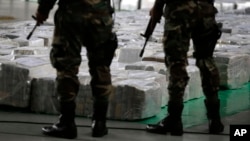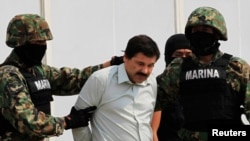A U.S. prison sentence handed down to a Mexican attorney is the final chapter in a long investigation by federal authorities that shed light on the Sinaloa cartel's attempts to expand into the lucrative European market for cocaine.
A U.S. district judge in New Hampshire sentenced Rafael Celaya on Monday to 17 years in prison for his role, along with eight co-defendants, in a drug-trafficking case involving Joaquin “El Chapo” Guzman, the Sinaloa cartel boss and world's most wanted drug lord.
Federal Bureau of Investigation agents told Reuters that informants and undercover operatives in the case were able to get unprecedented access to Guzman by making contact with his first cousin and holding out an opportunity to ferry drugs to Europe.
While the Mexican cartels control much of the U.S. drug market, Colombian cartels have long been dominant in Europe, according to Europol, the law enforcement agency of the European Union.
"We said we had people in the U.S. and in Europe and that we had influence in a port in Spain and from there it really just took off," said an FBI agent who declined to be named because he is now undercover in a separate probe.
Since the arrests, Europol has not detected any increased presence of the Sinaloa cartel, agency spokeswoman Veronica Sanchez said, even as other Mexican cartels have made connections with Europe-based organized crime groups.
‘Operation Dark Water’
The FBI dubbed the investigation "Operation Dark Water" for the name of the town in Mexico — Agua Prieta — where the probe originated. It began in 2009 and ended in 2012 with Celaya and other defendants arrested in Spain, where the cartel had arranged a multimillion-dollar shipment of more than 760 pounds (345 kg) of cocaine.
Celaya is the last defendant arrested in the case to be sentenced. Guzman's cousin, Manuel Gutierrez Guzman, received a 16-year prison sentence in August. Joaquin Guzman escaped in July from a maximum security prison in Mexico and is still at large. It was his second jail break in the past 15 years.
Celaya, now in jail, plans to appeal the sentence. His attorneys have argued that the government failed to show the cartel actually wanted him to be involved.
The undercover agents met more than a dozen times with cartel members abroad and in the United States, including meetings in New Hampshire. At one secretly recorded meeting in 2010, Celaya presented himself as a financial planner working for Guzman and the cartel, who was adept at setting up shell companies and laundering illicit proceeds, prosecutors said.






